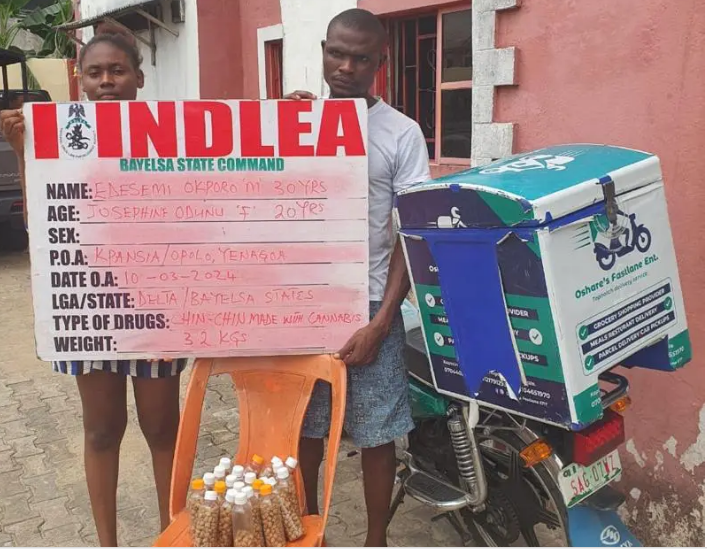The National Drug Law Enforcement Agency, NDLEA, says its operatives have arrested a 20-year-old hair stylist, Josephine Odunu, and a dispatch rider, Edesemi Ikporo, 30, for selling and distributing illicit drug-laced chin-chin to school students and at social parties in Yenagoa, Bayelsa State.
NDLEA recalled that its officers on patrol around Opolo area of Yenagoa had on Sunday March 10 2024 intercepted the motorcycle dispatch rider and recovered 200grams of chin-chin produced with cannabis sativa, which he was on a mission to deliver to a buyer.
According to the anti-narcotic agency, a swift follow up operation led to the arrest of Odunu, who distributed the drugged chin-chin from the salon where she works in the Kpansia area of Yenagoa.
This was made known in a statement issued by Femi Babafemi, the NDLEA’s Director of Media and Advocacy, on Sunday.
Babafemi said a search of the salon also led to the recovery of 3 kilograms bringing the total weight of the illicit substance seized from the duo to 3.2kg.
The spokesman further disclosed that investigations revealed that they distribute the chin-chin often laced with cannabis and tramadol to students and at birthday parties.
Babafemi alleged that while Edesemi handles the delivery to buyers, Josephine is a major distributor to a wanted suspect who produces the drugged chin-chin.
He also said NDLEA operatives in Adamawa State on Wednesday March 13 arrested two wanted suspects, Ajim Samuel (aka Boss), 30, and Davidson John Joshua (aka Dantala), 36, while on their way from Onitsha, Anambra State, where they had gone to buy a consignment of tramadol containing 14,428 pills of the opioid which they tucked in the body compartments of their black Honda Civic car marked YLA 623 SL.
Babafemi said they were arrested along Numan-Jalingo road. Also recovered from them were 21grams of cannabis and monetary exhibits totaling N19,280.
Announcing further interceptions and seizures made by the NDLEA over the week, Babafemi said: “In Osun State, commercial bus driver, Ogunleye Adegoke, 49, was arrested along Gbongan-Ibadan road after NDLEA operatives discovered 2,000 capsules of tramadol, 60 tablets of rohypnol and 10 bottles of codeine syrup concealed in the spare tyre compartment of his vehicle. While a total of 343,000 pills of opioids were seized by NDLEA officers from a suspect, Lawan Abubakar, 33, in Azare town, Katagum, Bauchi State on Friday 15th March, same day the Nigerian Army transferred a suspect, Muhammadu Rabi’u, 37, with 64,000 pills of tramadol recovered from him to the Bauchi state command of NDLEA.
“At least, 24kg of cannabis was seized from the driver of a transport company, Ikechukwu Obialo, at Sagamu Interchange, Ogun state by NDLEA operatives on Wednesday 13th March, while in Kano, two suspects: Ali Amadu, 27, and Adamu Hassan, 33, were nabbed with a total of 125.3kg cannabis; 3,400 pills of tramadol; and 30 bottles of codeine syrup. They were arrested on Monday 11th March at Gadar Tamburawa area, and Friday 15th March at Tsamiya Babba, Hotoro respectively.
“While 118 kilograms of cannabis were recovered from a warehouse in Masaka area of Nasarawa state on Saturday 16th March, NDLEA operatives in Edo state on Thursday 14th March arrested a suspect, Kole Samuel, 50, with 75kg of same psychoactive substance at market area, Otuo, Owan East LGA. Same day, operatives raided the Oloma-Okpe forest in Akoko Edo LGA where they destroyed 3,944.2075 kilograms of cannabis on 1.577683 hectares of farmland.”
Reacting to the development, the Chairman/Chief Executive Officer of NDLEA, Brig. Gen. Mohamed Buba Marwa (Retd) commended the officers and men of the Bayelsa, Adamawa, Osun, Bauchi, Nasarawa, Edo, Kano, and Ogun Commands of the Agency for their outstanding feats in the past week.
He applauded their counterparts in all the commands across the country for intensifying their WADA advocacy lectures thus creating a fair balance between their drug supply reduction and drug demand reduction efforts.


